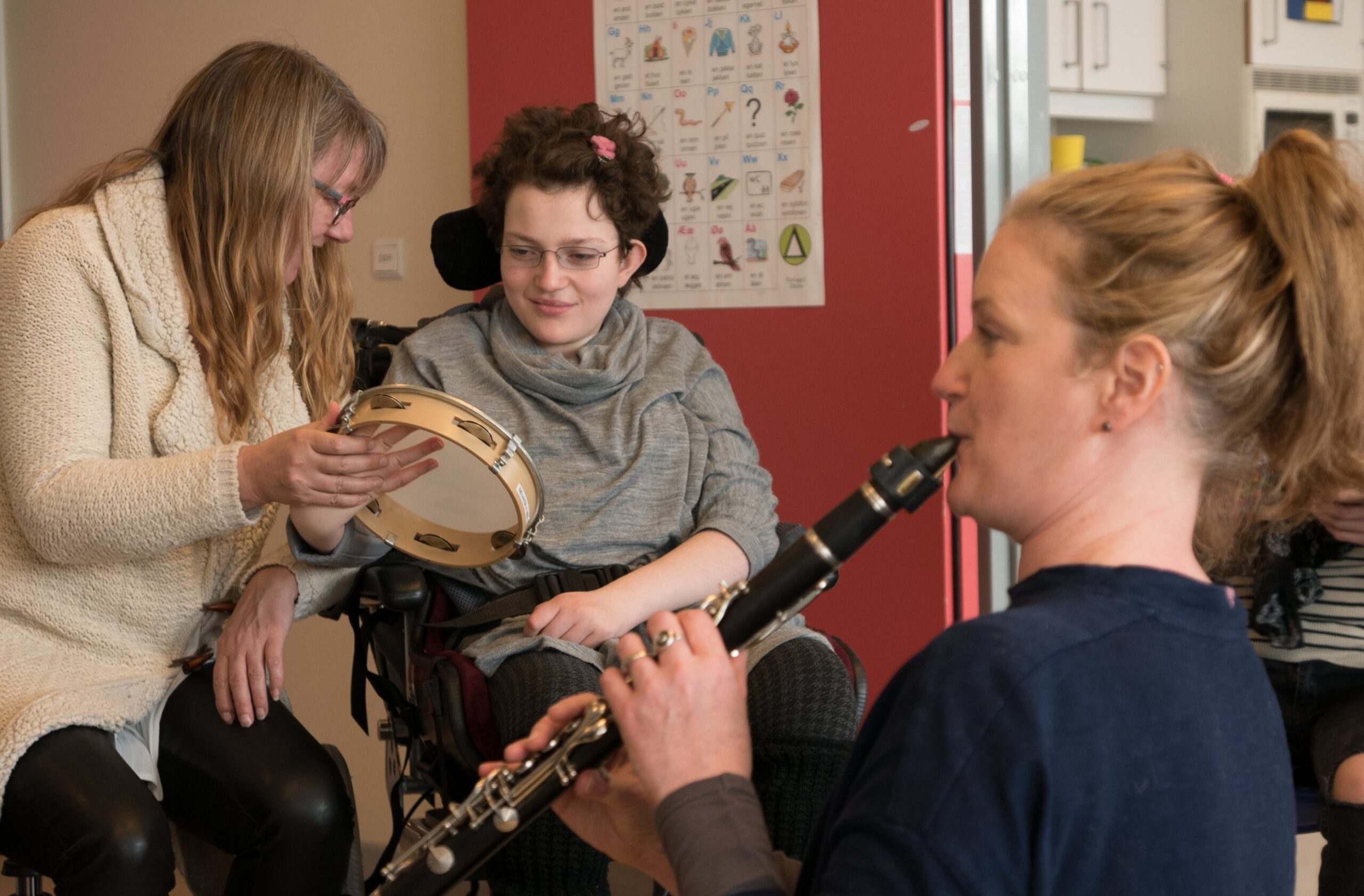
Making music with Ros Hawley playing the clarinet
From small beginnings
What could two independent music practitioners achieve by starting international conversations about music-making with children with special needs? Tom Northey tells the story.
In 2015 I began a conversation with music and special needs practitioner Ros Hawley about working internationally. This was motivated by three shared goals:
- To enable UK music leaders to share their expertise with musicians in other countries to increase the range and quality of music-making with children with special needs.
- To learn from other countries and contexts how this work happens, who delivers it, how it’s funded, how it relates to wider music practice, and to bring that knowledge back to the UK.
- To develop international networks and opportunities for this specialist (and largely freelance) workforce, so that they can better support and learn from each other, wherever they are based.
This initiative was also a response to a lack of international music and special needs networks, and the difficulties for even mid-sized arts organisations in accessing funding to collaborate with partners overseas.
What could two independent practitioners achieve through knocking on doors and starting conversations?
We wanted to ask what might be possible working at a smaller scale. What could two independent practitioners achieve by knocking on doors and starting conversations? We soon found out it was quite a lot.
Finding the right partners
Through attending conferences, follow-up desk research and phone conversations, we had soon connected with a number of specialist musicians in Stockholm and with Swedish development agency Musikalliansen.
A visit to Copenhagen led to a further relationship with contemporary music ensemble Figura. There was clearly a strong interest in working together to develop music and special needs practice in their local settings.
From November 2015 we worked with these partners and others to produce a series of masterclasses, workshops and pilot projects. Highlights thus far include:
- A training programme for five Swedish musicians to work with profoundly disabled children, followed by a music project in a Stockholm special school.
- A training session in Copenhagen for musicians from Figura Ensemble and a two-day creative project in a Copenhagen special school, with additional reflection and mentoring for the musicians.
- A further training session for nine musicians in Stockholm in the field of music, special needs and healthcare settings.
- A series of research meetings with colleagues across the Swedish arts and health sectors.
- Funding secured for a larger-scale creative project with profoundly disabled children in Stockholm, led by local partners with input from other UK musicians.
Significant outcomes
The musicians involved described significant benefits in working with a specialist practitioner in a field that was new to them. They also valued the opportunity to connect with other local musicians interested in similar work, to plan future collaborations and self-produced projects.
Peter, a Danish musician, said: “We had a session in the special school which was very moving. One of the students started really responding and leading us. We created something that arose in that moment. It was very intense, and our own musical skills had a place in it.”
The children and schools involved in the workshops benefited from working in a creative way with exceptional local musicians, whom they would otherwise not connect with. There was also an excitement and enjoyment in having visiting musicians from the UK, who brought different ideas, approaches and the opportunity for children and staff to practise their English.
A teacher at a Copenhagen Special School said: “You were good to take time with each child, and let them have time to say what they wanted and what they could do. The children were heard, and you saw the small contributions they made and used them in the concert. It could not have been the same without your ears for hearing them all.”
The project also had a significant impact on Ros who relished the opportunity to work with and mentor international musicians, particularly in the area of improvisation. This has led her to look again at how to develop ‘inclusive improvisation’ in her own practice.
Funding the work
From the outset we had sought to deliver the work without being reliant on UK or EU grants. Project partners generously supported this work, in recognition of the professional development benefits for the musicians involved. Some local partners went on to secure their own funding for follow-up projects from relevant arts councils and statutory agencies.
Next steps
We are continuing to talk to partners in Sweden, Denmark and the UK about building on this practitioner network. The goal is to help each other secure resources and develop projects in each country, building in opportunities for visits, skills exchange and collaboration to inspire even more ambitious work.
There have certainly been challenges along the way. Without the funding or support of a large organisation, everyone has had to give a lot of planning time for free. But the project has energised all the musicians involved and created future international employment opportunities.
And for the next generation of professional musicians, this ability to work across and beyond borders may well be essential.
Tom Northey is Director of Con Brio.
www.conbrio.co
Join the Discussion
You must be logged in to post a comment.